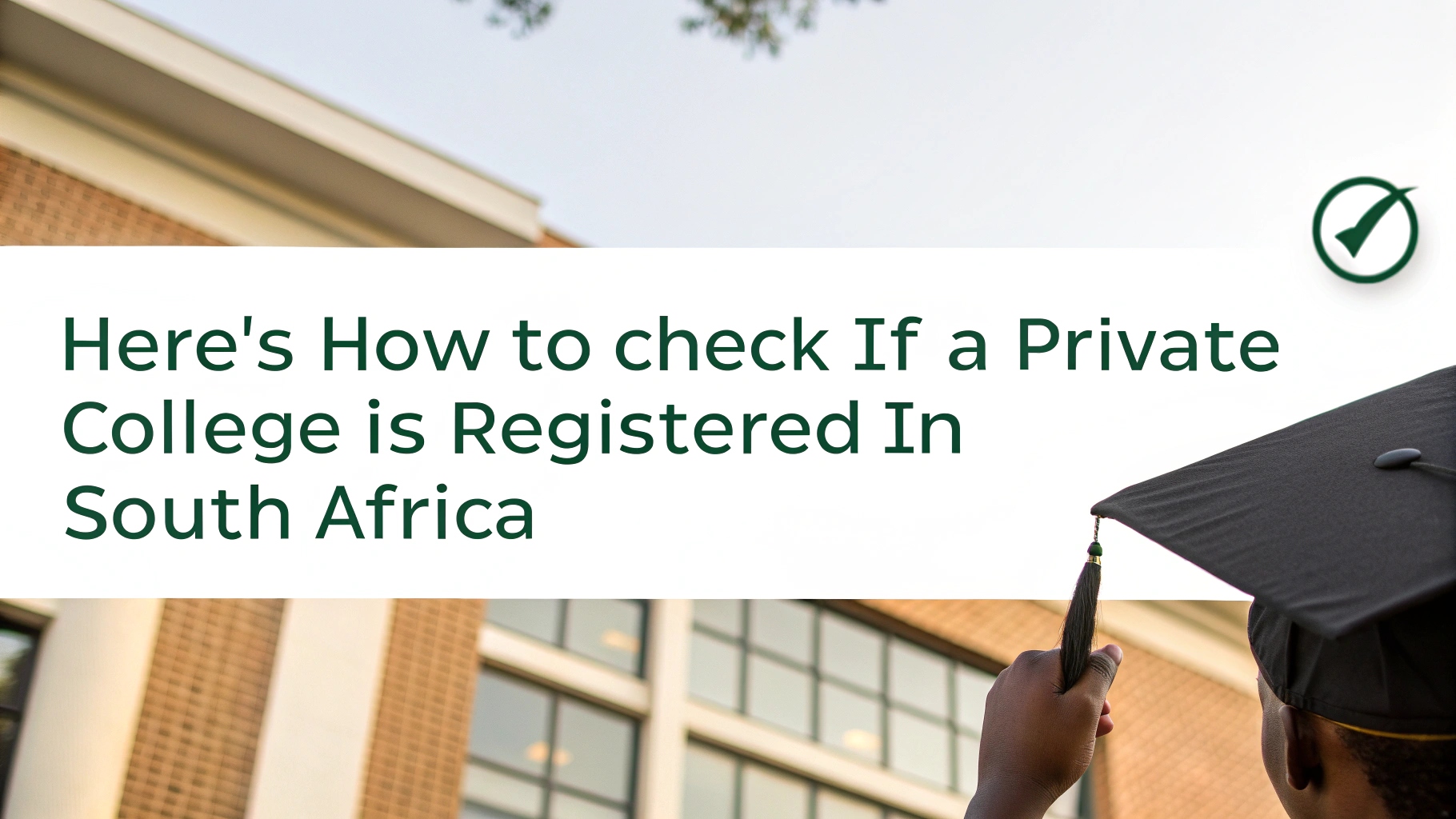Here's How to Check if a Private College is Registered in South Africa

Choosing the right college is one of the most important decisions you’ll make for your future. In South Africa, private colleges offer a wide variety of courses ranging from short skills programs to full diplomas and degrees. However, not all private colleges operate legally. Some unregistered institutions mislead students with false promises, leaving them with worthless qualifications and financial loss.
To avoid being scammed, it's crucial to verify whether a private college is registered with the Department of Higher Education and Training (DHET). In this blog post, we’ll walk you through the step-by-step process of how to check if a private college is registered in South Africa.
Why Registration Matters
Before we dive into how to check, let’s first understand why registration is so important:
-
Legal Recognition: Only registered colleges are legally allowed to offer higher education qualifications.
-
Quality Assurance: Registered institutions are monitored to meet certain academic and infrastructural standards.
-
Valid Qualifications: A qualification from a registered college is recognised by employers and other educational institutions.
-
Access to Bursaries: Many financial aid programs are only available to students studying at registered institutions.
Attending an unregistered college can result in your certificate being considered invalid. You may not be able to use it for employment, further studies, or even apply for bursaries or internships.
Types of Private Colleges in South Africa
Private colleges in South Africa fall under two main categories:
-
Private Higher Education Institutions (PHEIs)
These offer degrees, diplomas, and higher certificates. They must be registered with the Department of Higher Education and Training (DHET) under the Higher Education Act of 1997. -
Private TVET Colleges
These offer vocational and occupational programs. They must also be registered with the DHET, but under different legislation known as the Continuing Education and Training Act of 2006.
Depending on the type of qualification you're interested in, you’ll need to check registration against the correct list.
How to Check If a Private College is Registered (Step-by-Step)
Here’s a simple guide to verify if a college is operating legally in South Africa:
Step 1: Visit the DHET Website
The Department of Higher Education and Training (DHET) regularly updates a list of registered institutions. Here's how to access it:
-
Go to the official DHET website:
👉 https://www.dhet.gov.za -
Navigate to the menu or search bar and look for:
-
“Registers”
-
Or search for:
-
Registered Private Higher Education Institutions
-
Registered Private TVET Colleges
-
-
-
Click on the most recent PDF document of registered institutions. This document includes all private colleges legally registered to operate in South Africa.
Step 2: Search the College Name
Open the downloaded PDF and search for the name of the college you’re interested in. You can do this by:
-
Pressing Ctrl + F on your keyboard (or Command + F on Mac)
-
Typing the name of the college into the search bar
Check the following details carefully:
-
Full name of the institution
-
Registration number (e.g., 2001/HE07/012)
-
Qualification(s) offered
-
Validity dates (check if registration is still current)
If the college is listed, it means it is officially registered and legally allowed to offer the qualifications mentioned.
Step 3: Verify SAQA Accreditation
If the college offers a qualification, you can go a step further by checking if the qualification is registered with the South African Qualifications Authority (SAQA):
-
Visit: https://www.saqa.org.za
-
Click on "Qualifications and Part Qualifications"
-
Use the search tool to type the name of the qualification
-
Confirm if it appears in the National Qualifications Framework (NQF)
This step ensures that the qualification is recognized nationally and meets quality standards.
Step 4: Contact the DHET for Confirmation
Still unsure? You can contact the DHET directly to confirm the status of any private college:
-
Email: registrations@dhet.gov.za
-
Phone: +27 12 312 5911
Provide them with the college’s name, physical address, and course you're enquiring about. They’ll confirm whether the institution is registered and whether it can legally offer the course you’re interested in.
Step 5: Beware of Red Flags
When considering a private college, be cautious of the following warning signs:
-
No physical address or only online presence
-
They promise a qualification in a very short period (e.g., “Get your degree in 3 months!”)
-
No registration number is displayed on their website or marketing materials
-
Pressure tactics to enroll quickly or pay upfront fees
-
Fake logos or endorsements claiming “accredited by DHET” without proof
If any of these sound familiar, it’s best to walk away and look for alternatives.
What to Do If You’ve Already Enrolled in an Unregistered College
If you discover that you’re studying at an unregistered private college, here’s what you should do:
-
Stop Paying Fees – Don’t continue paying money to an illegal institution.
-
Report Them – File a report with the DHET so they can investigate.
-
Look for Alternatives – Find a registered college offering a similar qualification.
-
Seek Legal Advice – If you’ve lost money, consider reaching out to a consumer protection agency or legal advisor.
Final Thoughts
With so many options available, private colleges offer great opportunities to further your education and improve your career prospects. But it's up to you to ensure the college you choose is registered and reputable.
Taking the time to verify a private college’s registration status could save you years of wasted effort and thousands of rands. Use the official tools available, ask questions, and don’t be afraid to double-check. Your education is an investment—make sure it’s protected.